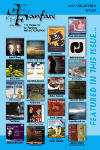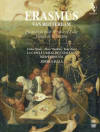Texte paru dans: / Appeared in: |
||||
|
Reviewer: J.
F. Weber Jordi Savall has outdone himself with this latest book-size thematic issue, the ninth by my count (two more seem to be imminent). The subject is the life of Desiderius Erasmus (1466-1536), born in Rotterdam, narrated and illustrated by music of his time. Unlike previous programs of this type, we get the whole program on three discs and the music without narration on three more discs. Since the narration is mostly laid over the music, the playing time of the two sets of discs is almost the same. The first three discs have narration in French, but a PIN is supplied to enable these discs to be downloaded from the website in any of six other languages (the discs, not just the texts). After downloading the English version (you are entitled to as many as you want), I decided to stay with the discs supplied, since the texts are printed in the 668-page book. The text portion for each language runs over 80 pages, but since the photos and other illustrations are varied through the book, the total unique content is far more than 80 pages. In many ways, Erasmus was an enigma. His humanist writings underlay the thinking of the Reformation leaders, yet Erasmus remained a Catholic all his life. He was ordained an Augustinian canon in 1492, but he was soon dispensed from community life, served the bishop of Cambrai for just a year, then studied theology in Paris. He spent the rest of his life traveling from one city to another. Eight years in Basel was the longest single sojourn, but he left when the city officially accepted the Reformation. His first visit to England, where he befriended Thomas More (whose humanist Utopia was a parallel work to The Praise of Folly), was a turning point in his life. Dedicated to More, the Latin title of his work, Encomium Moriae, was a pun on his name. Applying the humanist exegesis of Classical literature, he published the first printed edition of the Greek New Testament with a new Latin translation and edited the writings of Jerome, Augustine, John Chrysostom, Origen, and other Fathers of the Church. Luther sought his support, but Erasmus wrote a defense of free will which Luther tried to refute. The Reformation made his life difficult, for his friends on both sides criticized him for opposite aspects of his writings. The first disc focuses on the philosopher’s principal work, The Praise of Folly, accompanied by many treatments of the enduring La Folia (Gregorio Paniagua devoted a whole disc to the Spanish versions of this dance, Fanfare 6:1; CD in 7:6). The other two discs treat the life and times of a great humanist, one disc for reflections, the other for times of confrontation. The music that accompanies the readings is not often consequential, but it fits Savall’s conception. Along with many anonymous works are pieces by Dufay, Ockeghem, Josquin des Prez, Sermisy, John Lloyd, Isaac, Du Caurroy, Moderne, Morales, and Trabaci. Among the most notable are Josquin’s lament for Ockeghem, Nymphes des bois, recorded many times, and Appenzeller’s lament for Erasmus, Plangite, Pierides, recorded only by Konrad Ruhland in “Staatsmusik der Renaissance.” The photos of the participants, the portraits of the historical figures, the reproductions of paintings and engravings of the period, all are beautifully laid out in generous size. I’m inclined to think that Savall’s packages are bought very often as gifts, for they are very impressive in every way and will likely flatter the recipient for his presumed good taste and intellect. | ||||
|
||||
|
|
|
|||
|
|
|
|||
|
Cliquez l'un ou l'autre
bouton pour découvrir bien d'autres critiques de CD |
||||




